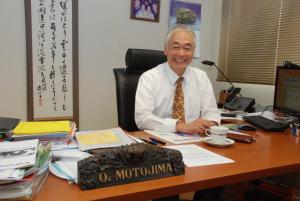The new ITER management structure takes shape
4 Mar 2011
-
Osamu Motojima, ITER Director-General
It is my pleasure to announce today that the ITER Council has completed the written procedure for the appointment of Richard Hawryluk as the new Deputy-Director General and Director of the ITER Administration Department. Rich Hawryluk was the Deputy-Director of the Princeton Plasma Physics Laboratory and has made an outstanding career in the field of fusion research. Up until now, Rich has also been a member of the ITER Management Advisory Committee (MAC). It is envisaged that Rich will take up his duties here in the ITER Headquarters in April. With this appointment, the three-department structure of the ITER Organization comprising the Department for Administration, the Department for ITER Project and the Department for Safety Quality & Security is now fully in place.
Another important new feature in the organizational structure is the fact that the Project Office will fuse with the Department for Administration, which also comprises the Directorate for Finance and Budget. This decision was made to increase the transparency between budget planning and project management. This is an important change in strategic management and both my Deputies, Richard Hawryluk and Remmelt Haange who is heading the Department for ITER Project, are fully committed to this.
And there is more news on the reorganization of our project structure: As of this week, the Bureau of International Cooperation will be operational. The creation of this new Bureau follows the endorsement of the new management structure by the ITER Council last November, and it is in line with the agreement of the most recent Project Board Meeting held this week.
The main goal of this new Bureau—in short BIC—is to facilitate the communication and to enhance the interaction between the ITER Organization and the ITER Members and their Domestic Agencies. The success of this project, one of the most ambitious scientific endeavors ever launched, will very much rely on our mutual understanding on how to implement the ITER Agreement.
The BIC will comprise six Deputy Director-Generals (DDGs) who have been appointed by the ITER Council based on nominations made by me and after consultation with the Member of their origin. Amongst the DDGs I will appoint a Head and, further to that, I may assign other staff to the BIC to support its activities.
The main function of the BIC will be to advise me and report to me concerning the overall strategies of the ITER Organization for cooperation and communication with the Members, and to enhance and facilitate this cooperation. I further expect the BIC to help me in my decision making and also in disseminating information on the project to the Members. One aspect of the new BIC's charge will also be to monitor the ITER Organization's cooperation with the Members, their Domestic Agencies and other relevant institutions and to liaise with high-level representatives of the Members on my behalf as and when necessary. I also expect the BIC to encourage applications from qualified candidates from the Members as we aim for an improved balance that corresponds to each Member's contribution to the project.
I want to express my gratitude to all of you for your patience and understanding, as this whole restructuring exercise necessarily takes time. This is certainly a challenging period for all of us, but it will soon be completed. And then we will move on towards our overall goal: building ITER and showing to the world that fusion is the way forward.


